“What are you thinking? How are you feeling? What have we done to each other?”
It is impossible to sit with a straight brow when Nick Dunne, the protagonist of David Fincher’s ‘Gone Girl’, adapted from Gillian Flynn’s eponymous novel, mouths these lines during the opening of the film, looking at his wife, calling them “the primal questions of marriage.” I, for one, am petrified as a man at the possibility of inhabiting the same space with any one of the female protagonists from Gillian Flynn’s fertile imagination. To be calling them demented, or sociopathic, or even psychopathic would simply be euphemizing the unsettling brilliance of these characters, and to the kind of complex yarn Flynn has spun them out from.

Having recently watched ‘Sharp Objects’, an HBO limited series based on Flynn’s novel of the same name, I admit that it was a nightmare revisiting Amy Elliott Dunne in ‘Gone Girl’. It is true when they say that ‘Gone Girl’ is possibly among the worst movies you could pick for watching on a date night. The film, simultaneously working as a deconstruction of modern marriages and media sensationalization in the current day and age also presents a frighteningly real picture that makes you paranoid and uneasy, while it may also go on to unnerve a thing or two in your relationship. Consider yourself warned!
What makes Gone Girl click, perhaps most, (not counting its obvious credits as a well-made film and a taut thriller), is that we have all been there. We have all been part of a manipulative relationship, stuck with a manipulative partner, or been cheated upon wherein all hell broke loose once the masks of normalcy were shed. While watching the film, Nick Dunne’s plight makes you feel for him, just as you feel for Amy when Nick’s affair is revealed, even looking for reasons to justify Amy’s twisted plan for revenge against Nick. The end is where all comes undone, and Amy does something the equivalent of what Nick could never have pulled off. I know of at least a dozen guys who turned and looked at their girlfriends in disbelief, looking at Amy’s antics on screen. “Hell hath no fury like a woman scorned” could have then perhaps served as a better marketing line for the film.
Synopsis
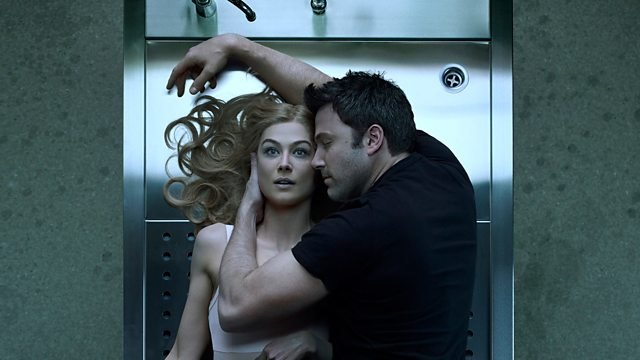
‘Gone Girl’ is a story of the trials and tribulations that a couple, Nick and Amy Dunne go through in their young marriage. With all things breezy at first, life eventually hits hard and things spiral out of control as problems in their marriage and individual selves surface. With money problems at the helm and a failing marriage, Nick cheats on Amy with his young student, to which Amy decides to exact revenge by mysteriously disappearing one day and leaving an elaborately planned plot that unravels in her wake, sure to land Nick in prison for the murder of his wife, or penalised by death. The unraveling of the plan in brilliant fashion and Amy’s return when her plan doesn’t work out the way she’d hoped it would, form the major and best bits of this dark thriller.
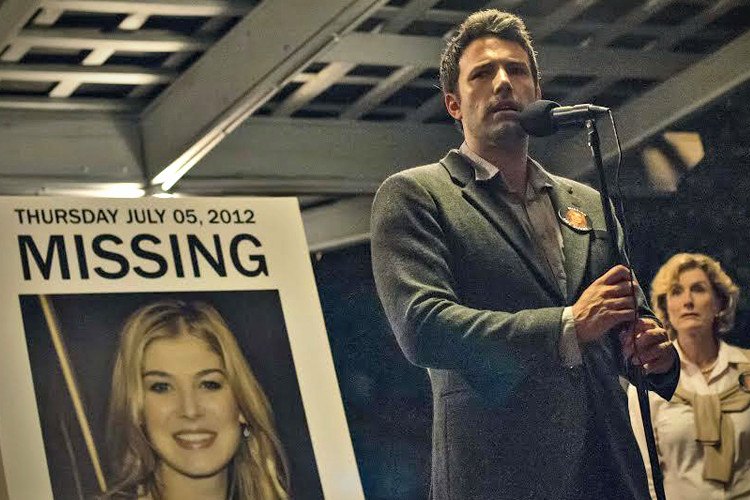
While ‘Gone Girl’ is not Fincher’s best work by any yardstick, it is a solid and well-made film, benefitting heavily from the screenplay penned by Flynn herself. It is also one of his most entertaining films in the sense that it kept me glued even during repeat viewings, which is a feat in itself for a suspense thriller. Rosamund Pike as Amy is chilling to the spine in her most cold moments, and the effective bits of the film rest on her able shoulders. Ben Affleck too shines in the role of the husband, but the film almost entirely belongs to Pike’s performance and Amy’s psychotically manipulative character.
The Crackdown of Modern Relationships
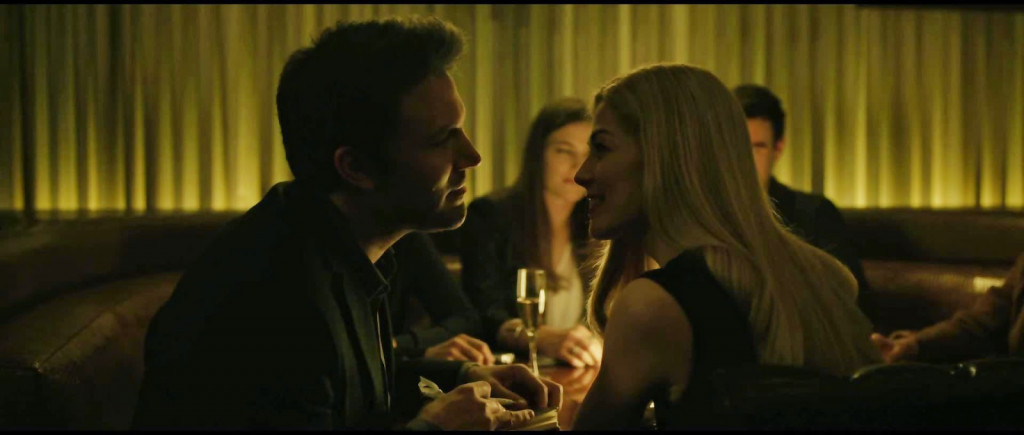
The film might just be a discourse on modern relationships, marriages and romantic life in general for a contemporary couple. I am not saying that the horrific happenings of the second half of the film are how every relationship proceeds (we’d be damned), but consider this. Nick and Amy from the first half could be anybody. They are both smart, independent, appeal to each other’s sensibilities, fall for each other and naturally take the next step: getting married. So, what keeps that marriage afloat when you take off the rose-tinted glasses and things get too real too soon? It is the instant when even full-time commitment morphs itself into something greater that you truly see your partner for what they are.
Most marriages that make it past these ‘tests’ are those that last. It is, as Ben Affleck narrates at one instance in voiceover in the film while contemplating his failing marriage: “Want to test your marriage for weak spots? Add one recession, subtract two jobs. It’s surprisingly effective.” Nick and Amy’s perfect world too is tested, and as problems (money, jobs, credit, jadedness, priorities) come to the fore, their uglier sides are revealed to their partners, giving way to resentment. On their fifth anniversary, Nick wishes to inform Amy about his decision to seek divorce, not knowing she had different plans in mind.
The Ending
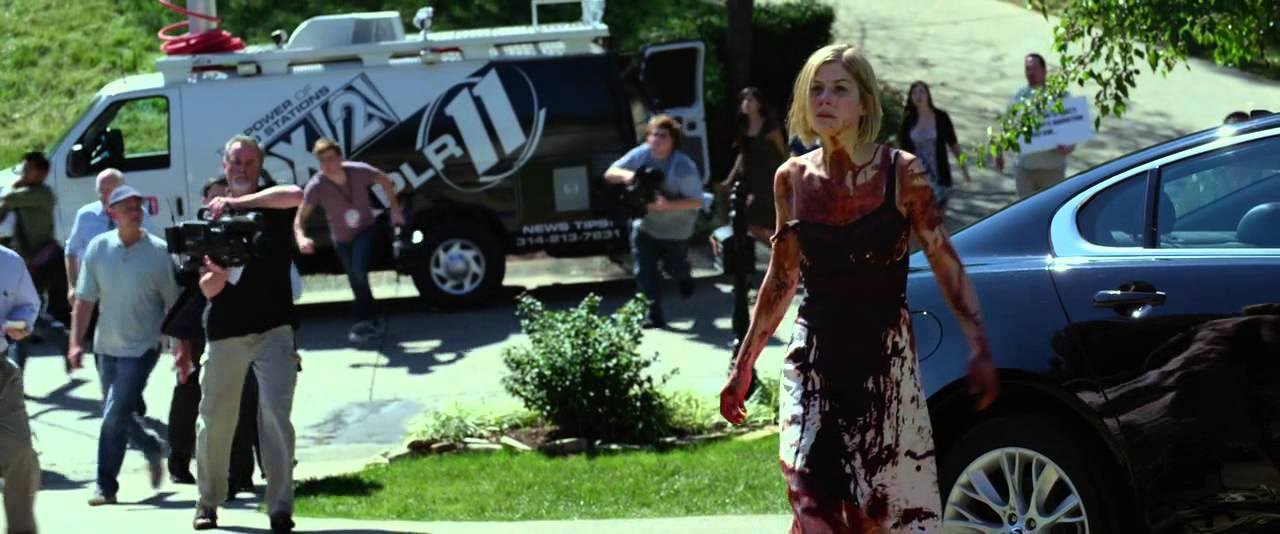
Unequivocally, the ending remains the epitome of the film. Brutal, unflinching, and grotesquely unsettling, the ending leaves you with a sense of uneasiness that may last days. Let me try to sum it up, lest words fail to recreate the absolute shock of it.
Having been robbed of her money by her neighbours at the campground in the Ozarks, Amy turns to Desi Collings, her long-time lover and ex-flame against who she’d earlier filed a restraining order. She convinces Desi that she ran away due to Nick’s abusive nature, and he agrees to house her in his isolated lakehouse, hoping to rekindle lost love. Meanwhile, Nick is arrested due to incriminating evidence found against him, but not before he makes a rousing revelation on television asking for Amy’s and the public’s forgiveness in an attempt to lure her out.
This ‘seemingly’ works, as Amy, under the pretext of having sex with Desi, slits his throat with a box cutter and elopes, returning to Nick covered in Desi’s blood. She states Desi as her captor and confesses that he kidnapped and raped her, which is corroborated with Desi’s semen found inside Amy and footage and injury marks Amy staged to make Desi look guilty. The FBI buys that, even though Detective Rhonda Boney, the investigating officer is discerning and questions her on possible loopholes in her story. She returns home to Nick, and both of them pretend to be the happy couple the public sees them as.
On being confronted by Nick, she confesses she came back because Nick pleaded her on national television to do so, and she now wanted to see him become that very man. She threatens to destroy his reputation if he left, as Nick is left baffled contemplating his future with a killer under the same roof, even though she reassures she would never hurt Nick, also expressing her wish that Nick participates in correcting the wrongs of their marriage. This escalates as Amy starts acting like the perfect wife, preparing breakfast for him. Nick decides to expose her on TV for what she’d done, but Amy surprises Nick by revealing that she was pregnant by artificially inseminating herself using Nick’s sperm stored at a fertility clinic for testing. He threatens to leave, violently confronting her, but is manipulated into staying when Amy says that she won’t need to teach his child to hate him if he left. The two of them then continue with their lives under the limelight, also bagging a book deal, a movie offer, and a franchise for Nick and Margo’s bar, as they reveal Amy’s pregnancy on television, and the credits roll.
The Nick-Amy Dynamic
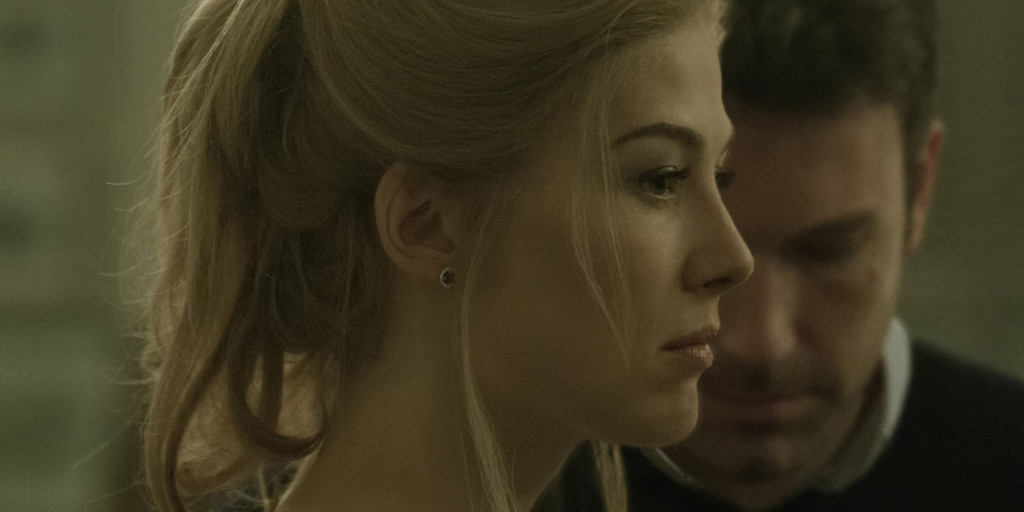
While I may not go as far as calling Amy a psychopath, she definitely is a sociopath, for the very reason she eloped and set Nick up in the first place. Also, in a latent, twisted way, she does care for Nick. There are definitely more facets to the fact that Nick chose to stay with Amy, and why Amy returned, despite all that conspired. At this point, it would be safe to say, Nick and Amy never really loved each other. They were briefly attracted to each other, but they ‘fell in love’ with the roles the other played, rather than their real selves.
Amy is a narcissistic, controlling woman. Nick is an ignorant and lazy fellow, not to forget a liar and a cheater too. That is what their reality is. A relationship between their real selves would be a ticking time bomb, as it later proved to be. Their roles, the ones they played at the beginning of the film that made them fall for each other, the masks they put on then made them return to each other towards the end of the film. It is then ironic that their resolution to not become “that” couple landed them exactly there.
The Nick-Amy dynamic is one that is not explained by a cause and effect relationship or linear mechanism, but is rather better represented cyclically, wherein one feeds off another. Amy derives strength to feed her narcissism and her constant need for attention from Nick, stating multiple times how he could not have landed anyone better than her. Nick sees himself rise to the occasion when he has to woo Amy, and this is the Nick he likes more, the cooler Nick: one who proposes in suave fashion in front of a group of reporters and has sex in a library to keep things exciting. Currently in the film’s timeline, he basks in the role of the loving, reformed husband who got a second chance at love. Their ‘roles’ is what they become in the end.
“Amazing Amy and the humbled husband!”, as remarked by Margo. Between all this, one is left to wonder who is the more manipulative of the two: the cheating husband who put up a face on live television, luring the wife out of hiding? Or the murderous wife who calculated every one of her moves till the very end? While you contemplate on that, this section has presented us with some significant findings that will help answer two of the most important character questions the film’s ending raises.
Why did Amy kill Desi Collings and return to Nick?

It would be crude to say that poor Desi Collings was just a bait sacrificed in the deadly game of one-upmanship that Nick and Amy found themselves in, but it is harshly true in a lot of ways. Yes, Amy returned to him when she was robbed and her plan backfired. The game changed when she saw Nick confess his infidelity on television, and pleaded for her to come back. “Maybe I only need to reach one”, he said. That, he did.
An important part of Amy’s planned punishment for Nick was public humiliation and for him to be hated by the nation perhaps. All that changed when Nick shifted the public’s sentiment towards him by becoming the remorseful husband who then had the public’s commiseration. That is Amy’s unbecoming, who then returns to Nick to resume her role, her faced that she’d donned, of ‘Amazing Amy’. She kills Desi in cold blood and uses her condition and ‘abuse’ to dodge any questions that may reveal the truth. Nick perhaps realises the true reason of her return, attention and the public eye, irrespective of the murder, when the first expression he has when Amy returns and collapses in his arms is “You f**king bitch!”. The last part of that may just be true.
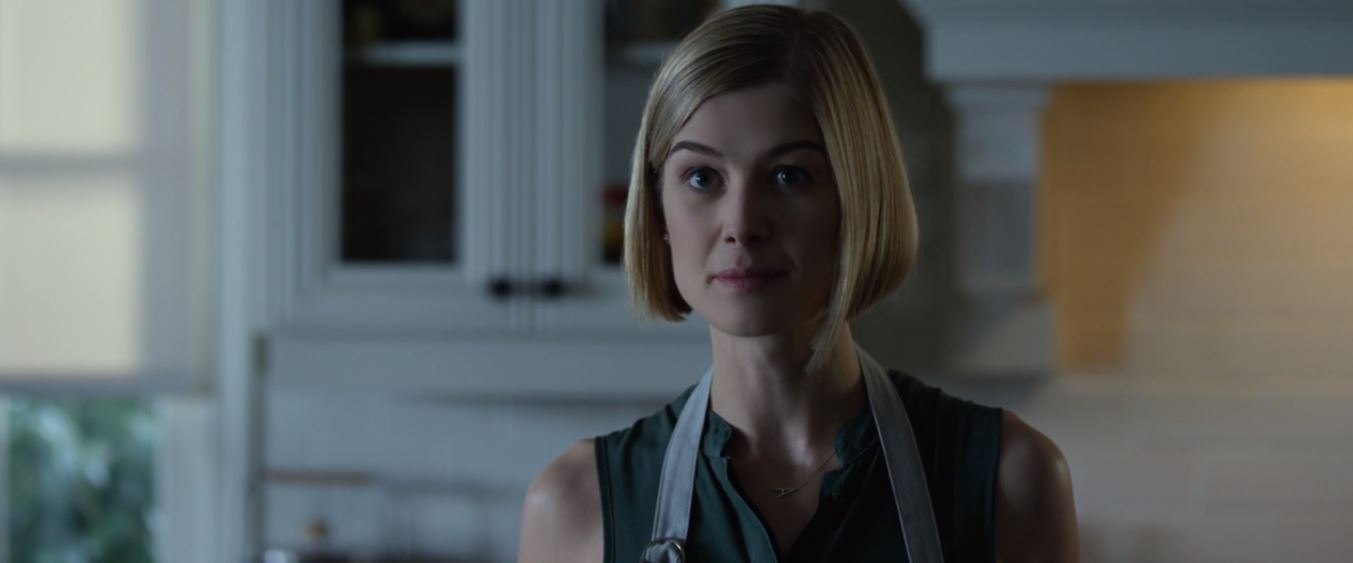
As soon as she does return, her image in the public eye changes. From poor Amy who was abused at the hands of her husband, it becomes that of a fighter, and a survivor, one she happily enjoys and enrols her unwilling husband along to play the game, on her conditions. Fearful, but brilliant. She now has the public eye, and is confident enough to manipulate Nick into staying with her, and becoming the husband she desires.
Why did Nick stay?
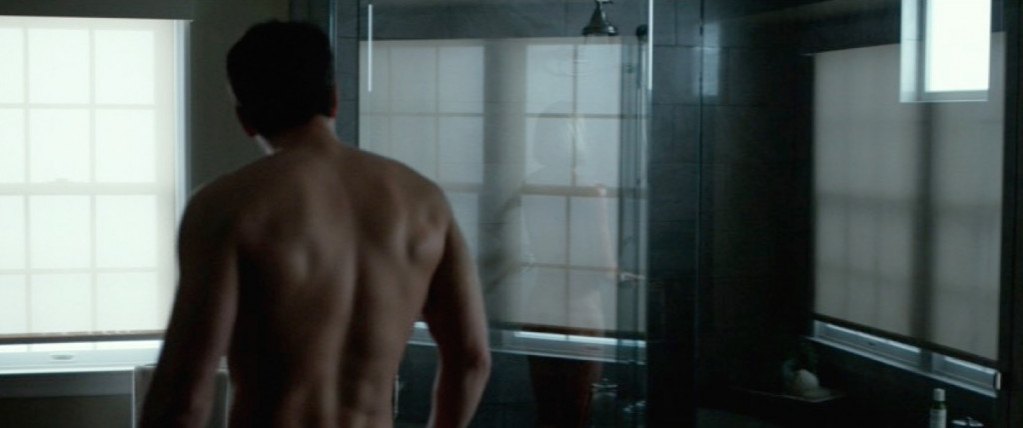
Important question, with an arguably simple answer. I will let this fantastic piece of dialogue from the film let you in on it.
Nick Dunne: {Pushing Amy against the wall on being threatened] You fucking cunt!
Amy Dunne: I’m the cunt you married. The only time you liked yourself was when you were trying to be someone this cunt might like. I’m not a quitter, I’m that cunt. I killed for you; who else can say that? You think you’d be happy with a nice Midwestern girl? No way, baby! I’m it.
Nick Dunne: Fuck. You’re delusional. I mean, you’re insane, why would you even want this? Yes, I loved you and then all we did was resent each other, try to control each other. We caused each other pain.
Amy Dunne: That’s marriage.
Nothing, I repeat, nothing in the film hit me as hard as this singularly amazing conversation. Kudos to Flynn for keeping it real. Behind the far removed illusions that our society currently finds itself rested on, the last leg of this conversation is like a kick in the groin. Now, back to scrounging for answers.
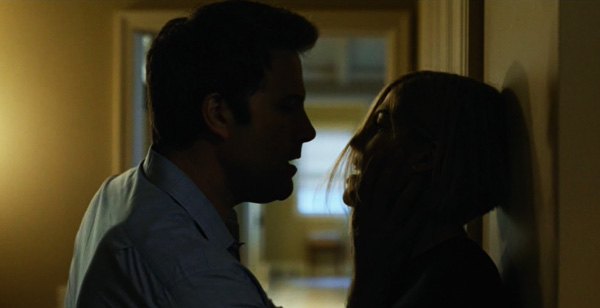
Yes, Amy’s revelation of her pregnancy and her threat of making sure Nick’s baby would grow up to hate him was one of the reasons, but it wasn’t the only one. Nick stayed because of what Amy said; as twisted as it may sound, Nick began to draw some sort of sadistic gratification from the little game that transpired upon Amy’s return back home. As discussed, The Nick he became when he wanted to woo Amy was the Nick Amy wanted him to be. The Nick he became from rising up to Amy’s little game is the Nick he wanted to be. With his little time in the limelight and stint with the media and the public, fickle as the Roman mob, he has learnt the game of manipulation that Amy masters. Deep inside, he WANTS to be seen as the loving husband who will give everything to make their marriage work, upon being given a second chance at love. Again, twisted, but brilliant.
What next for Amy and Nick?
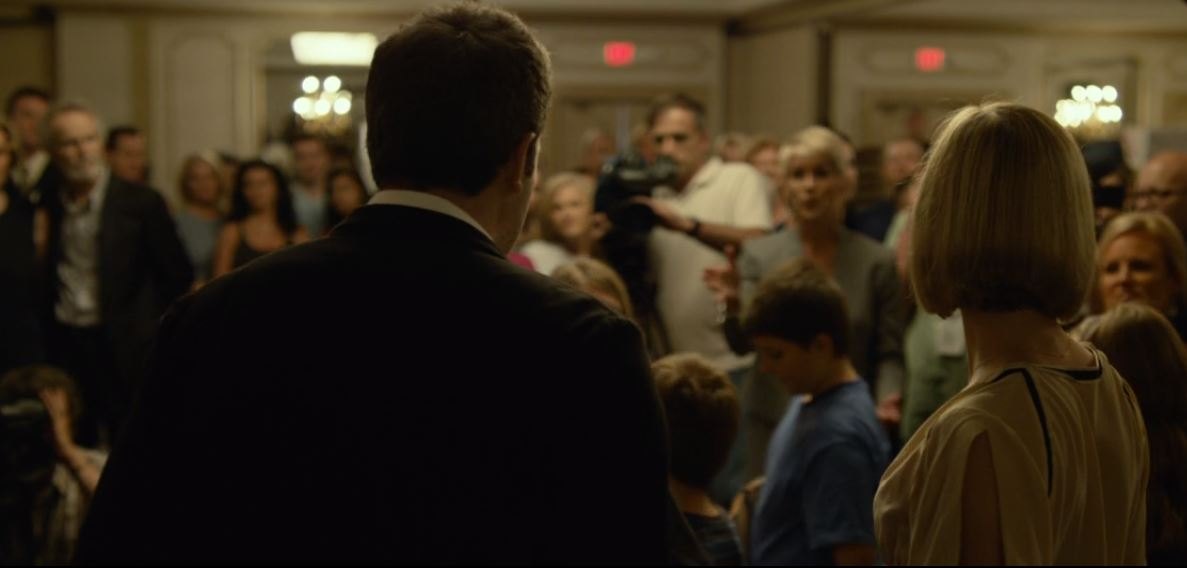
“When two people love each other and can’t make that work, that’s the real tragedy.”
Far from making it work, actually. Tanner Bolt was correct on account of saying two things. One, Amy and Nick’s current predicament is a perfect predicament. A twisted, almost psychotic, manipulative couple like that living under the same roof? I’d pay to watch that. The second, when he warns Nick not to piss her off, and we all know Nick is smarter than that.
For what’s said and shown, their future might hold more than just a book and movie deal. There will be tensions, manipulations and perhaps a violent confrontation and breakdown or two. Throw a baby in the mix, and things are bound to spice up a little more. They might even grow into the roles they assume under the guise of normalcy. However, in front of a camera, they’d both know better to put on their alternate faces, those of America’s tabloid sweethearts. A couple touched by the miracle of the Mississippi, a couple given a second chance at love, a couple that survived.
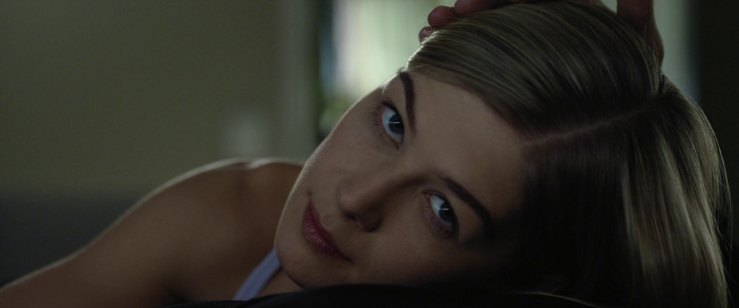
The film closes with virtually the same frame and quote it begins with, the prime difference being Amy’s diabolical smile, with Nick running his hands through Amy’s hair. Picturing her head, cracking her lovely skull, unspooling her brains, looking for answers. Dear girlfriend, can’t resent that I didn’t think the same when the film ended.
“What are you thinking? How are you feeling? What have we done to each other? What will we do?”
Read More in Explainers: Sharp Objects | American Psycho | Passengers

